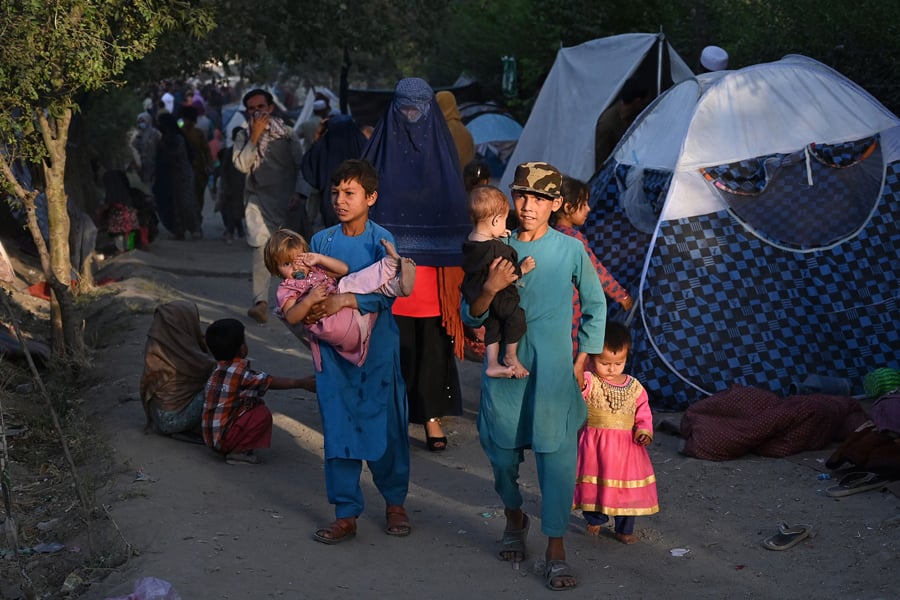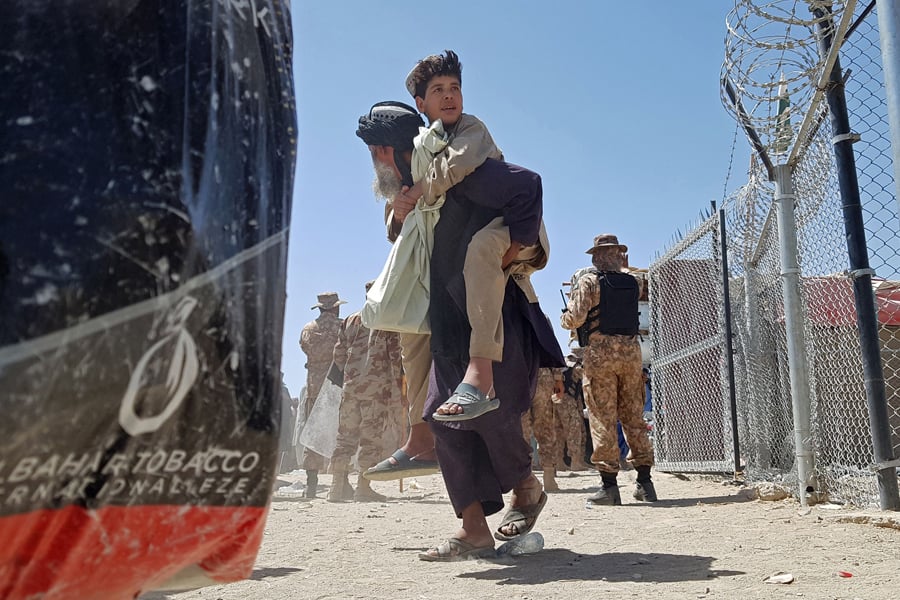Catholic Charities Fort Worth helps Afghan immigrants build new lives

Internally displaced Afghan families, who fled from Kunduz, Takhar, and Baghlan province due to battles between Taliban and Afghan security forces, walk past their temporary tents at Sara-e-Shamali in Kabul on August 11, 2021. (Photo by Wakil Kohsar/AFP)
FORT WORTH — Alice Kigera appeared serene and joyful, despite the whirlwind of activity.
The program manager for Refugee Resettlement Services for Catholic Charities Fort Worth, Kigera had less than 24 hours’ notice that an Afghan family of seven would be arriving at the airport.
She and her team sped into action to get an apartment equipped, from furniture to toothbrushes. They hurried to put some groceries in the refrigerator before picking them up at DFW Airport to welcome the immigrants to their new home.
In August, Catholic Charities Fort Worth saw a sharp uptick in the need for refugee resettlement, when 25 Afghans holding special immigrant visas arrived from processing in Fort Lee, Virginia. Having previously completed an extensive background check and security screening in Afghanistan, the immigrants received medical clearance at Fort Lee and were assigned to Fort Worth where a friend or family member already resided.
Plans are in place for CCFW to receive at least 20 more immigrants, and Kigera expects a steady stream to follow.
“We have a number of Afghans who already had their visas but now they are being evacuated because the Taliban is taking over,” said Kigera, who has worked for CCFW for 12 years.
Bishop Michael Olson said he appreciates the work of CCFW's staff embracing their Christian call to uphold the dignity of each and every single person.
"I'm grateful and proud that CCFW, as a nonprofit arm of the Diocese of Fort Worth, is assisting people in such a zealous and reasonable way," he said.
These immigrants served as contractors for U.S. troops in Afghanistan. Already at personal risk, the Afghan allies face heightened prospects for retaliation since the Taliban seized control of the capital city of Kabul on August 15. The U.S. State Department said 20,000 Afghans who served as interpreters, security officers, drivers, and other vital positions have applied for special immigrant visas.
Citing data from the International Rescue Committee, a global nongovernmental humanitarian relief agency, the New York Times said more than 300,000 Afghan civilians “have been affiliated with the American mission over its two-decade presence in the country ... but a minority qualify for refugee protection in the United States.”
In 2006, the U.S. Congress first authorized a bipartisan humanitarian program to provide Special Immigrant Visas, or SIVs, for nationals from Afghanistan and Iraq that include resettlement services and legal permanent residence for the approved principal applicants, their spouses, and children.
Since the creation of the program, the U.S. Conference of Catholic Bishops’ Migration and Refugee Services has worked with the U.S. Department of State, the Office of Refugee Resettlement, and other nongovernmental organizations to provide resettlement services to some of the more than 73,000 Afghan SIV holders and their families.
On July 14, the White House announced the emergency relocation of Afghan SIV applicants in their final stages of processing to the United States. The first of that group arrived in the United States July 30.

A stranded Afghan national carries his son at the Pakistan-Afghanistan border crossing point in Chaman on August 13, 2021, after the Taliban took control of the Afghan border town in a rapid offensive across the country. (Photo by AFP)
Jeff Demers, the regional coordinator/director for the North Texas Office for Refugees, anticipates that the initial Afghan clients of CCFW will be special immigrant visa holders, and later Afghan refugees will arrive.
The humanitarian crisis in Afghanistan will be measured in years, not weeks and months. Demers, who has worked in refugee resettlement for 23 years, said that the war in Iraq ended almost 10 years ago, “and it’s dwindled way down, but we still see some Iraqi SIV clients that come through.”
He continued, “I think there’s going to be a very focused effort to try to get some of the Afghan allies out quicker, so it may not be that long, but it may be over the course of several years to get out everyone who feels their lives are being threatened, at risk.”
Demers, who communicates with the five other refugee resettlement agencies in Texas, said that the situation with the Afghan immigrants differs in its urgency. Where the agencies may have had weeks to prepare for previous resettlements, the immigrants from Afghanistan are arriving with notification as short as several hours.
A community effort
When it became clear that the Taliban was taking over Afghanistan very quickly, capturing 26 out of 34 Afghan provincial capitals in just 10 days, Kigera began to get calls and emails from community members who anticipated the arrival of Afghan immigrants.
Photos and news video of the chaos in Afghanistan touched the hearts of Texans, including Deb McNamara, interim president/CEO of CCFW. She said, "We are grieving with the people of Afghanistan as we continue to help each family who comes to us. We may never understand the traumatic experience they faced getting here but we are prepared to walk alongside them as they begin their journey here in America. What a privilege to serve these brave families, including so many that served alongside our troops. There can be no truer way to welcome the stranger than in times like these.”
In these situations, employers, individuals, and faith communities across the spectrum of religions step up to offer assistance.
Demers said, “We’ll see people of all different faiths, all different walks of life, that will come together with the six resettlement agencies and help however they can…. Fort Worth has always had a very welcoming community.”
The regional job market is very good, and Kigera said employers have called with job opportunities for the immigrants.
Kigera said, “At six months, 100 percent of Catholic Charities clients are working, unless they have health issues. At four months, we have at least 85 percent of them working.”
“It’s a big challenge, but the Metroplex is well ready for helping. We know the parishes will help in a tremendous way,” added Demers.
Bishop Olson added that the Afghan refugees “particularly can provide a service and fill much-needed employment positions in areas like translation and security because of their experience in assisting the men and women of the American military in the dangerous situation of the war on terror.”
Kigera said parishioners can help with donations of gently used furniture, kitchen items, and clothing. Gift cards or donations of new bedding, towels, and hygiene items are also appreciated.
“Basically, it’s anything they would need to set up an apartment. They’ll come with, maybe, a suitcase apiece, or what they were able to grab as they were leaving their home,” said Demers.
CCFW has a storage facility on its Fort Worth campus, and Kigera said that equipping an apartment is much easier if the “supply depot” is stocked.
In June, the U.S. Conference of Catholic Bishops, anticipating an uptick in refugee resettlement, provided additional funding for CCFW to hire two additional staff members, which Kigera said “has come in really handy.”
A labor of love
Why invest so much time and effort into the plight of someone from the other side of the world?
Kigera emphasized that Catholic social teaching honors the dignity and value of everyone. She said, “We are people of faith serving people of need.”
Demers echoed the sentiment. “We love people because Jesus loves us, and Jesus loves people. People that know Jesus, love like Jesus.”
And although they anticipate their jobs will be quite busy for the foreseeable future, they are excited about the long-term potential.
Kigera said typically refugees arrive in a state of panic, but within a few months the children are in school and the parents are employed, speak English, and have learned to drive.
Kigera said, “Getting their dignity back, and providing for their family — that is the most beautiful thing to see. The strength and resilience of these people.”
Demers finds satisfaction in his work from the moment the immigrants arrive at the airport displaying a mixture of joy, fear, and exhaustion. “It shows us how God created us so complex. You literally see every emotion come out on their face, but it’s such a sweet, almost a holy moment. You get a glimpse into their heart. You have to hold that in such honor, because they are so scared. . . . They’ve allowed you into this special space, but they have to because they have no one else that they can turn to.”
This article contains reporting from Catholic News Service.
